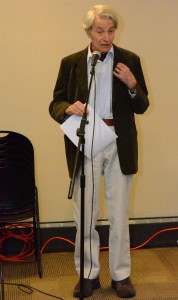- About Ramapo
- Academics
- Admissions & Aid
- Student Life
- Athletics
- Alumni
- Arts & Community
- Quick Links
- Apply
- Visit
- Give
EMINENT HISTORIAN PROBED COLLABORATION, RESISTANCE AND RETRIBUTION IN WORLD WAR II
(PDF) (DOC) (JPG)December 22, 2015
(MAHWAH, NJ) –Dr. István Deák, Seth Low Professor Emeritus at Columbia University, discussed “Collaboration, Resistance and Retribution” on October 13 The Gross Center for Holocaust and Genocide Studies sponsored this event.
Dr. Deák explored how during World War II the people and countries occupied by or allied with Nazi Germany faced innumerable moral and ethical dilemmas: whether to cooperate with their occupiers, try to survive the war without any political involvement, or risk their lives by becoming resisters. Many chose all three, depending on particular conditions at the time.
dilemmas: whether to cooperate with their occupiers, try to survive the war without any political involvement, or risk their lives by becoming resisters. Many chose all three, depending on particular conditions at the time.
Professor Deák also spoke about the postwar aftermath: the purges of real or alleged war criminals and collaborators, various acts of violence, deportations, and judicial proceedings.
Although born in Hungary, Istvan Deák has spent most of his life in the United States. After receiving his Ph.D. in Modern European History from Columbia University in 1964, he taught there until his retirement in 1997. From 1968 to 1979 he was also the Director of Columbia’s Institute on East Central Europe. Additionally, he has been a visiting professor at numerous U.S. and European universities, including in his native Hungary after the fall of communism in 1989.
In addition to Europe on Trial: The Story of Collaboration, Resistance, and Retribution during World War II (on which the above talk was based), published by Westview Press earlier this year, Professor Deak’s publications include, Weimar Germany’s Left-wing Intellectuals: A Political History of the “Weltbuhne” and Its Circle (The University of California Press, 1968); The Lawful Revolution: Louis Kossuth and the Hungarians, 1848-1849 (Columbia University Press, 1979), for which he received the Lionel Trilling Book Award of Columbia College, and which also appeared in German, Hungarian, and Romanian; Beyond Nationalism: A Social and Political History of the Habsburg Officer Corps, 1848-1918 (Oxford University Press, 1990), which received, among other things, the Wayne S. Vucinich Book Prize of the American Association for the Advancement of Slavic Studies, and which also appeared in German, Hungarian, and Italian; Essays on Hitler’s Europe (University of Nebraska Press, 2001) which also appeared in Hungarian and finally, with Marina Cattaruzza,Il processo di Norimberga tra storia e giustizia (Torino: UTET Libreria, 2006).
E-News Archives
| 2023 | 2022 | 2021 | 2019 | 2018 | 2017 | 2016 | 2015 | 2014 | 2013 | 2012 | 2011 | 2010 | 2009 | 2008 | 2007 |Copyright ©2024 Ramapo College Of New Jersey. Statements And Policies. Contact Webmaster.

Follow Us!